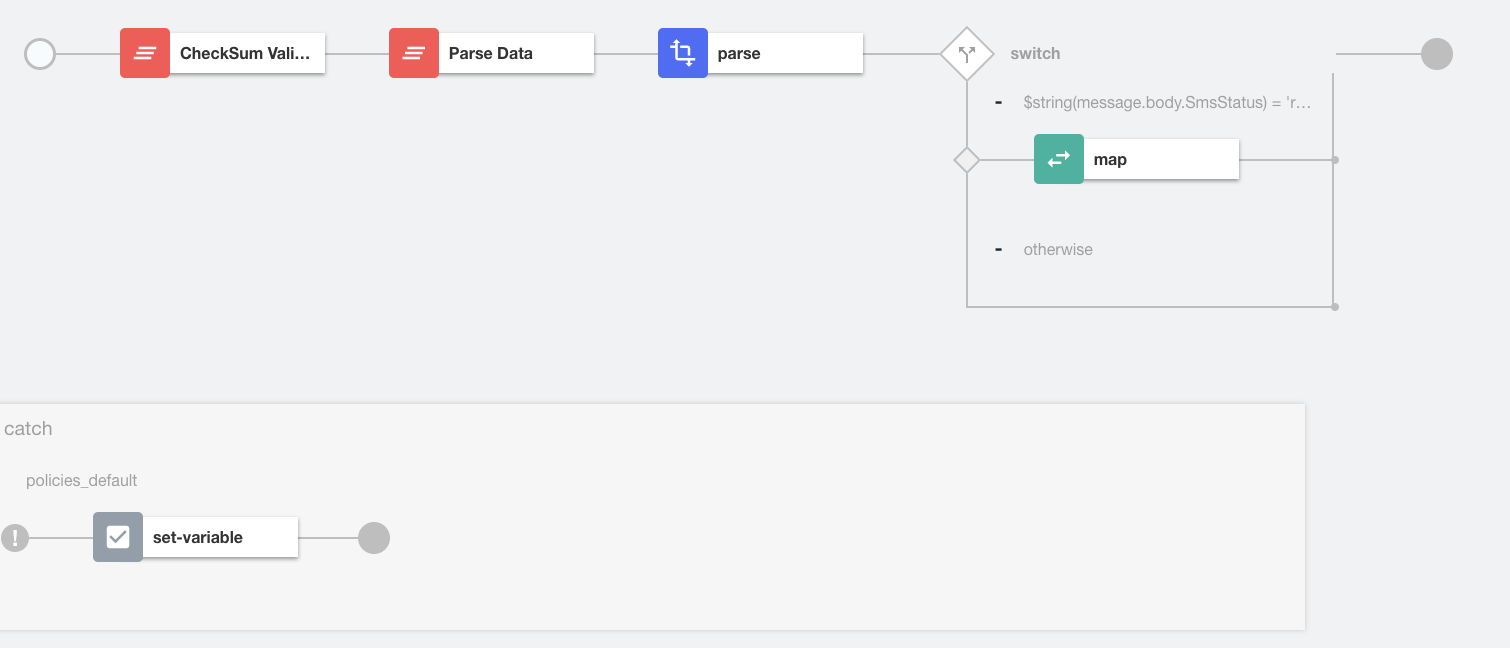Chatbot with Twilio via API Connect
Chatbots have been a current fashionable project to work on right now. An API Gateway is critical to help take the load off the main business application as well as providing a way to implement multiple Chatbot intermediaries without rewriting the business logic.

In this example we will make a request to WhatsApp. Twilio will forward that onto the API Gateway. The API Gateway will validate the HMAC Signature sent by Twilio and then simply return the the body back to Whats App.. Instead this map can be preceded with an invoke to reach a downstream service.
The downstream service will execute the business logic required and send a response to the API Gateway. The API Gateway would wrap this response with the Map Policy into the format required for Twilio.
This guide assumes that the user can configure Twilio with the basic settings. In Twilio you specify the API Gateway Endpoint.
Though this guide talks about Twilio the same flow can be used for other ChatBot providers meaning you can implement your business logic agnostic to the consuming body.

The first gateway script is responsible validating the HMAC form Twilio. Information on the validation can be found here. https://www.twilio.com/docs/usage/security#test-the-validity-of-your-webhook-signature
//############# These are the params that need updating
var params="https://123/123/123/123" //URL that the request is coming in on.
var key ='123123' //Auth Token from Twilio
//######
var crypto = require('crypto');
var hmac = crypto.createHmac('hmac-sha1', new Buffer(key) );
var dataList = new String(context.get('request.body')).split("&")
dataList.sort()
dataList.forEach(function(e) {
console.error(e)
if (e.startsWith('Body=')) {
e = e.replace(/\+/g," ")
}
params=params+e.replace(/=/g,"")//.replace("%3A%2B",":+")
})
// console.error(params)
var result = hmac.update(Buffer.from(decodeURIComponent(params), 'utf-8')).digest('base64');
if (result != context.get("message.headers.X-Twilio-Signature")) {
console.error("HMAC Error "+decodeURIComponent(params))
context.set("message.body", "HMAC Error "+decodeURIComponent(params))
throw new Error("CheckSumError")
}
The second gateway script is used to turn the requested payload into a javascript object.
The invoke to downstream systems will take place in the switch.
var d = context.get('request.body')
var dataList = new String(d).split("&")
dataList.sort()
var params = {}
dataList.forEach(function(e) {
var entry = e.split("=")
if (entry[0] == 'Body') {
entry[1] = entry[1].replace(/\+/g,' ')
}
params[entry[0]]=decodeURIComponent(entry[1])
})
console.error(params)
context.set('message.body',params)
The Switch is used to determine which operations need to be routed down stream.
The complete example is available below.
swagger: '2.0'
info:
title: WhatsAppBot
x-ibm-name: whatsappbot
version: '2'
schemes:
- https
basePath: /whatsappbotv2
securityDefinitions:
clientIdHeader:
type: apiKey
in: header
name: X-IBM-Client-Id
x-ibm-configuration:
cors:
enabled: true
gateway: datapower-api-gateway
type: rest
phase: realized
enforced: true
testable: true
assembly:
execute:
- gatewayscript:
version: 2.0.0
title: CheckSum Validation
source: >-
var
params="123123123123123"
//URL that the request is coming in on.
var key ='123123123123' //Auth Token from Twilio
var hmac = require('crypto').createHmac('hmac-sha1', new Buffer(key)
);
var dataList = new String(context.get('request.body')).split("&")
dataList.sort()
dataList.forEach(function(e) {
console.error(e)
if (e.startsWith('Body=')) {
e = e.replace(/\+/g," ")
}
params=params+e.replace(/=/g,"")
})
var result = hmac.update(Buffer.from(decodeURIComponent(params),
'utf-8')).digest('base64');
if (result != context.get("message.headers.X-Twilio-Signature")) {
console.error("HMAC Error "+decodeURIComponent(params))
context.set("message.body", "HMAC Error "+decodeURIComponent(params))
throw new Error("CheckSumError")
}
- gatewayscript:
version: 2.0.0
title: Parse Data
source: |-
var d = context.get('request.body')
var dataList = new String(d).split("&")
dataList.sort()
var params = {}
dataList.forEach(function(e) {
var entry = e.split("=")
if (entry[0] == 'Body') {
entry[1] = entry[1].replace(/\+/g,' ')
}
params[entry[0]]=decodeURIComponent(entry[1])
})
console.error(params)
context.set('message.body',params)
- parse:
version: 2.0.0
title: parse
parse-settings-reference:
default: apic-default-parsesettings
- switch:
version: 2.0.0
title: switch
case:
- condition: ($string(message.body.SmsStatus) = 'received')
execute:
- map:
version: 2.0.0
title: map
inputs:
input:
schema:
$ref: '#/definitions/hmacWhatsApp'
variable: message.body
content: application/json
outputs:
output:
schema:
$ref: '#/definitions/TwiML'
variable: message.body
content: application/xml
actions:
- set: output.Response.Message
from: input.Body
- otherwise: []
catch:
- default:
- set-variable:
version: 2.0.0
title: set-variable
actions:
- set: message.status.code
value: '400'
type: any
- set: message.status.reason
value: HMAC Checksum Failed
type: any
activity-log:
success-content: payload
error-content: header
enabled: true
buffering: true
application-authentication:
certificate: false
definitions:
Twiml-Response:
type: object
additionalProperties: false
properties:
Message:
type: string
TwiML:
type: object
additionalProperties: false
properties:
Response:
$ref: '#/definitions/Twiml-Response'
properties: {}
hmacWhatsApp:
type: object
additionalProperties: true
properties:
AccountSid:
type: string
example: AC6d968b21fc1e27103ab66c1d25c49f58
ApiVersion:
type: string
example: '2010-04-01'
Body:
type: string
From:
type: string
example: whatsapp%3A%2B44774728791
MessageSid:
type: string
example: SM6f708e26e46b2d4d64e4dcada9e5a0b6
NumMedia:
type: string
example: '0'
NumSegments:
type: string
example: '1'
SmsMessageSid:
type: string
example: SM6f708e26e46b2d4d64e4dcada9e5a0b6
SmsSid:
type: string
example: SM6f708e26e46b2d4d64e4dcada9e5a0b6
SmsStatus:
type: string
example: received
To:
type: string
example: whatsapp%3A%2B447747868792
paths:
/:
put:
responses:
'200':
description: success
schema:
type: string
consumes: []
produces: []
post:
responses:
'200':
description: success
schema:
type: string
consumes: []
produces: []
options:
responses:
'200':
description: success
schema:
type: string
consumes: []
produces: []



